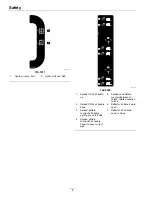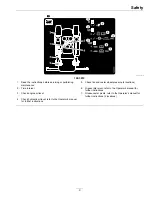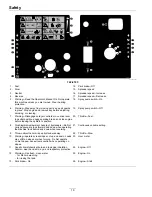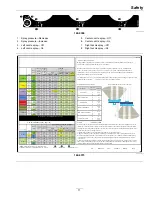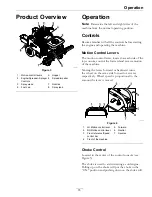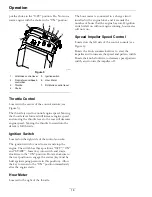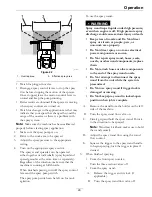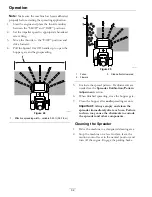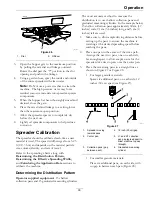
Operation
Chemical Safety
WARNING
Chemical substances used in the spreader-sprayer
system may be hazardous and toxic to you,
bystanders, animals, plants, soils or other
property.
•
Carefully read and follow the chemical
warning labels and Material Safety Data
Sheets (MSDS) for all chemicals used and
protect yourself according to the chemical
manufacturer's recommendations. Ensure
that as little skin as possible is exposed while
using chemicals. Use appropriate Personal
Protective Equipment (PPE) to guard against
personal contact with chemicals, such as:
– safety glasses, goggles, and/or face shield
– chemical resistant gloves
– rubber boots or other substantial footwear
– hearing protection
– respirator or filter mask
– clean change of clothes, soap, and
disposable towels, to be kept on-hand, in the
event of a chemical spill.
•
Keep in mind that there may be more than
one chemical used, and information on each
chemical should be assessed.
•
Refuse to operate or work on the
spreader-sprayer if this information is not
available!
•
Before working on a spreader-sprayer
system, make sure that the system has
been triple rinsed and neutralized according
to the recommendations of the chemical
manufacturer(s) and all of the valves have
been cycled three times.
•
Verify there is an adequate supply of clean
water and soap nearby, and immediately wash
off any chemicals that contact you.
•
Obtain proper training before using or handling
chemicals.
•
Use the correct chemical for the job.
•
Follow the chemical manufacturer's instructions
for the safe application of the chemical and Do
Not exceed recommended system application
pressure.
•
Handle chemicals in a well ventilated area.
•
Have clean water available especially when filling
the spray tank.
•
Do Not eat, drink, or smoke while working with
chemicals.
•
Do Not clean spray nozzles by blowing through
them or placing in mouth.
•
Always wash your hands and other exposed areas
as soon as possible after finishing the work.
•
Keep chemicals in their original packages and in a
safe location.
•
Properly dispose of unused chemicals and
chemical containers as instructed by the chemical
manufacturer and your local codes.
•
Chemicals and fumes are dangerous; never enter
the tank, hopper, or place your head over or in
the opening.
•
Follow all local/state/federal requirements for the
spreading/spraying of chemicals.
Fuel Safety
DANGER
Gasoline is extremely flammable and vapors are
explosive.
A fire or explosion from gasoline can burn you,
others, and cause property damage.
•
Fill the fuel tank outdoors on level ground,
in an open area, when the engine is cold. If
fuel is spilled, Do Not attempt to start the
engine. Move away from the area of the spill
and avoid creating any source of ignition until
fuel vapors have dissipated.
•
Do Not refill the fuel tank or drain the
machine indoors or inside an enclosed trailer.
•
Never smoke when handling gasoline, and
stay away from an open flame or where
gasoline fumes may be ignited by spark.
•
Add fuel before starting the engine. Never
remove the cap of the fuel tank or add fuel
when engine is running or when the engine
is hot.
•
Store gasoline in an approved container and
keep it out of the reach of children.
•
Do Not operate without entire exhaust system
in place and in proper working condition.
21
Summary of Contents for Z-SPRAY JUNIOR Series
Page 1: ...Z SPRAY JUNIOR SERIES For Serial Nos 411 294 212 Higher Part No 4505 818 Rev A...
Page 60: ...Notes 60...
Page 61: ...Notes 61...
Page 62: ...Service Record Date Description of Work Done Service Done By 62...
Page 63: ...63...


